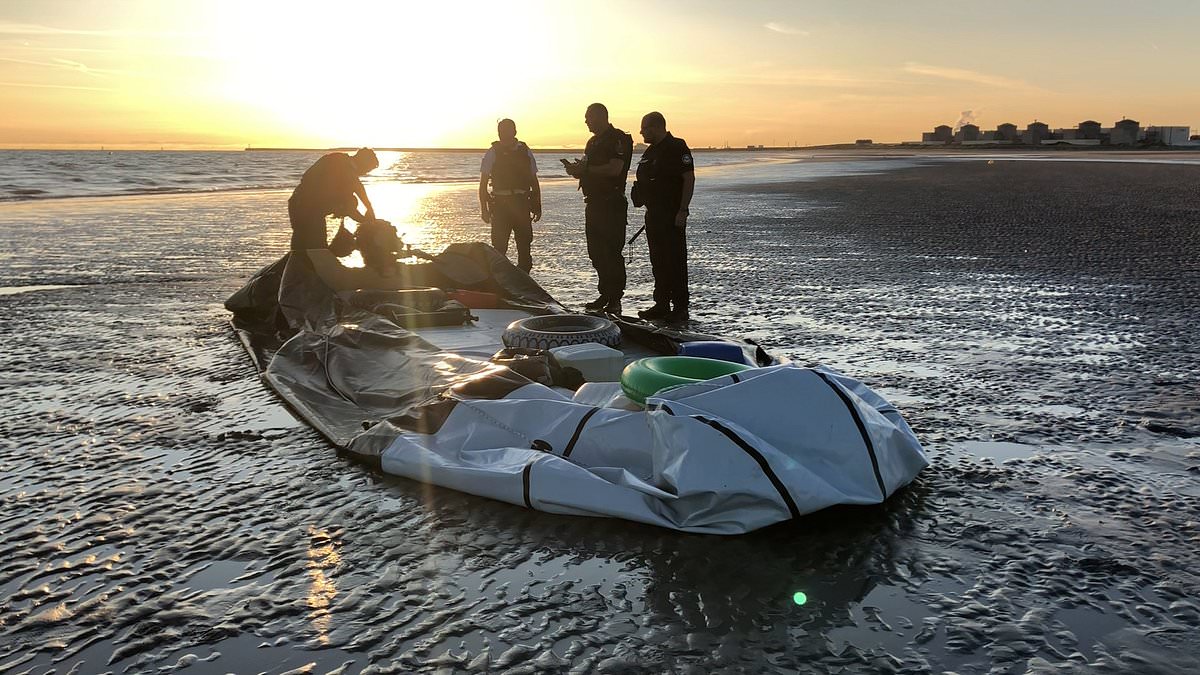Despite French police slashing people smugglers’ boats in an aim to discourage dangerous journeys across the Channel, it hasn’t deterred 900 migrants making the journey in the last two days.
This comes after the announcement of Keir Starmer’s new deal which allows Britain to send some migrants who crossed the Channel in small boats back to France.
A total of five boats carrying 353 came people crossed the English Channel yesterday and 573 arrived in 10 boats on Thursday, according to government data.
yesterday reported that only a day after unveiling the scheme alongside Emmanuel Macron, the Prime Minister was facing objections from Europe and charities that helped ground the Tories’ Rwanda plan.
The new scheme was condemned by campaigners, who said they would support court cases brought by small-boat arrivals chosen to be sent back to France. A border union boss said the legal challenges could take a year.
Brussels ominously warned that it was assessing whether the scheme complied with the ‘spirit and the letter of the law’, while governments including Italy were said to be harbouring ‘huge doubts’ about its legality.
It came as Home Secretary Yvette Cooper refused to say how many of the thousands arriving by dinghy will be removed under the pilot scheme, amid fears it could be even fewer than the 50 a week suggested by French officials this week.
Migrants waiting in Calais camps on Thursday laughed off any suggestions the deal was a deterrent, and were already seemingly aware of how to defy attempts to send them back.
On Thursday evening, Shadow Home Secretary Chris Philp told the Mail: ‘This pathetic arrangement may be sunk by legal challenges from activist lawyers and irresponsible charities who want to facilitate illegal immigration into the UK.
‘With illegal immigration across the Channel so far this year hitting record levels, Keir Starmer must now be bitterly regretting his foolish decision to cancel the Rwanda deterrent scheme before it even started.
‘After two years of legal challenges and legislation, the scheme was ready to go, but Starmer cancelled it just days before the first plane was due to take off last July.
‘This would have enabled 100 per cent of the illegal immigrants to be immediately removed without judicial interference.
‘The boats would soon have stopped. But Starmer is too weak and too mentally enslaved by his human rights lawyer friends to do what is needed to protect our country’s borders.’
Downing Street insisted the controversial ‘one in, one out’ agreement was legally sound and that Brussels supported it.
But fearing that returned migrants could head to Italy, the country’s interior minister told Sky News: ‘We know the EU Commission is still evaluating the agreement, and EU countries, including us, have huge doubts about security and legal aspects of the deal.’
A spokesman for the commission said: ‘On the specific envisaged co-operation between France and the United Kingdom, the commission will assess the concrete modalities of this co-operation.
Migrants arriving via small boat will be detained and returned to France in short order
A one-in, one-out system will operate with migrants sent back to France in exchange for asylum seekers
The plan is merely a pilot scheme – which could be canned if it doesn’t work
Only 50 a week will be sent packing – a fraction of the thousands crossing into the UK
‘And, of course, we continue to work with France and the UK, as well as other EU member states, to support solutions that are compatible with the spirit and the letter of EU law.’
A YouGov poll yesterday found 23 per cent of people strongly opposed the scheme, compared to 34 per cent of people who said they ‘somewhat’ support the scheme.
It has been a decade since a sporadic number of boats with migrants on board arriving off the Kent coast from France was reported in the media.
At the time, the focus was mainly on the thousands of attempts by migrants in northern France, who were attempting to stowaway on lorries and ferries to the UK.
In the nearby Calais Jungle thousands of people, including children, were living under canvass in a camp which was later cleared by the French authorities.
But as security was tightened around the ports and Eurotunnel, within three years, significant numbers were using small boats instead to make the dangerous crossing.
The cost for a single small boat journey can cost upwards of £1,500 for a single person with no guarantee that the journey will be a success.
In Gravelines – where the Mail has witnessed multiple ‘taxi boats’, which pick up migrants already in the water, while police stand by barred from acting through fear of causing drownings – deputy mayor Alain Boonefaes said the scheme was unfeasible.
Referring to increasing disputes between people-smuggling gangs and penniless migrants, Mr Boonefaes went on: ‘The residents are starting to get angry – some see campfires at the bottom of their gardens. Others have heard gunshots.’
He added that he had opposed a British proposal to put a barrier across Gravelines’ broad canal to the sea, where many of the taxi dinghies are launched – because it could make a sea rescue missions difficult, and interfere with the activities of a sailing school.
With such disagreement over tactics, it is perhaps no wonder the migrants are laughing.
There is also no guarantee that after being stopped on their journey that migrants will not try again.
